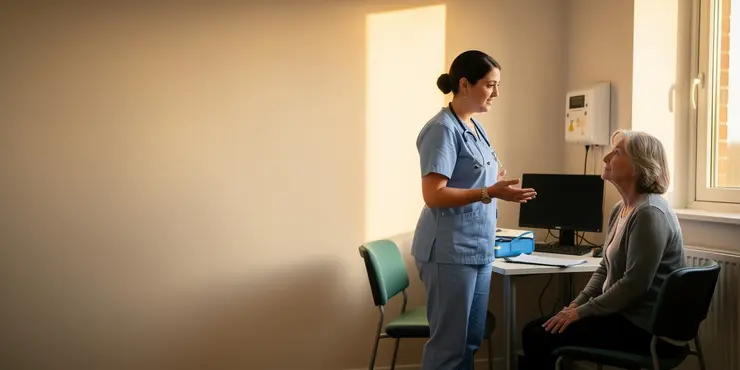Find Help
More Items From Ergsy search
-

BSL - Causes of insomnia
Relevance: 100%
-

BSL - Insomnia introduction
Relevance: 75%
-

BSL - Treatments for insomnia
Relevance: 74%
-

BSL - Insomnia self-help tips
Relevance: 72%
-

Is insomnia a common side effect of weight loss drugs?
Relevance: 68%
-

Talking therapy 'should be offered before pills' for people with insomnia | NHS Behind the Headlines
Relevance: 58%
-

Is it possible for alcohol alone to cause similar symptoms?
Relevance: 37%
-

What causes SAD?
Relevance: 32%
-

Causes of a sore throat
Relevance: 30%
-

What causes shingles?
Relevance: 30%
-

What causes hypotony?
Relevance: 30%
-

What causes autism?
Relevance: 30%
-
What causes tinnitus?
Relevance: 30%
-

What causes shingles?
Relevance: 29%
-

What causes appendicitis?
Relevance: 29%
-

What causes asthma?
Relevance: 29%
-

What causes BPH?
Relevance: 29%
-

What causes eczema?
Relevance: 29%
-

What causes thrombosis?
Relevance: 29%
-

What causes ADHD?
Relevance: 29%
-

What causes obesity?
Relevance: 28%
-

What causes sunburn?
Relevance: 28%
-

Causes of coeliac disease
Relevance: 28%
-

What causes psoriasis?
Relevance: 28%
-

What causes nettle rash?
Relevance: 28%
-

What causes cold sores?
Relevance: 28%
-

What causes jaundice in newborns?
Relevance: 28%
-

What causes viral meningitis?
Relevance: 28%
-

What causes Crohn's disease?
Relevance: 27%
-
Can health-related anxiety cause physical symptoms?
Relevance: 27%
-

What causes heart failure?
Relevance: 27%
-

What causes flesh-eating disease?
Relevance: 27%
-

What causes lupus in children?
Relevance: 27%
-

What causes Huntington's disease?
Relevance: 27%
-

Is it possible for self-tests to cause harm?
Relevance: 27%
-

What causes bacterial meningitis?
Relevance: 27%
-

Can scabies cause complications?
Relevance: 27%
-

What causes Alzheimer's disease?
Relevance: 27%
-

What causes Type 2 Diabetes?
Relevance: 27%
-

Can E. coli cause illness?
Relevance: 27%
Understanding the Causes of Insomnia
Insomnia is a common sleep disorder that affects a significant number of people in the United Kingdom. Understanding the underlying causes can help in seeking appropriate treatment and improving sleep quality. Below, we explore various factors that contribute to the onset of insomnia.
Stress and Anxiety
One of the primary causes of insomnia is stress and anxiety. Work-related pressures, financial concerns, and personal issues can lead to an overactive mind, making it difficult to relax and fall asleep. Chronic stress can significantly disrupt sleep patterns, leading to long-term insomnia if not properly managed.
Poor Sleep Environment
The environment in which you sleep plays a crucial role in the quality of your sleep. Factors such as noise, light, and an uncomfortable mattress can all contribute to difficulty in falling and staying asleep. Creating a restful and comfortable sleep environment is essential in mitigating insomnia.
Irregular Sleep Schedule
Maintaining an inconsistent sleep schedule can confuse your body's internal clock, making it challenging to establish a healthy sleep routine. Shift work, frequent travel, and irregular bedtimes can all disrupt your natural sleep-wake cycle, causing insomnia.
Lifestyle and Dietary Habits
Lifestyle choices, including the consumption of caffeine, alcohol, and nicotine, can adversely affect sleep quality. Caffeine and nicotine are stimulants that can keep you awake, while alcohol may initially induce sleep but can lead to fragmented sleep during the night. Late-night meals and heavy, spicy foods can also cause discomfort and sleeplessness.
Medical and Psychological Conditions
Certain medical conditions, such as chronic pain, asthma, and acid reflux, can lead to insomnia. Psychological conditions, including depression and PTSD, also play a significant role. These conditions not only affect your ability to fall asleep but can also disrupt sleep throughout the night.
Medications
Some medications, especially those prescribed for allergies, high blood pressure, and mental health conditions, have side effects that can interfere with sleep. It's important to discuss potential side effects with your healthcare provider if you suspect your medication is contributing to your insomnia.
In conclusion, insomnia can be caused by a variety of factors. Addressing these issues through lifestyle adjustments, medical consultation, and creating a conducive sleep environment can help improve sleep quality and overall health.
Understanding Why We Can't Sleep Well
Insomnia means having trouble sleeping. It is common and many people in the UK have it. Knowing why it happens can help you find the right help and sleep better. Let's look at some reasons why people can't sleep well.
Feeling Stressed and Worried
Stress and worry are big reasons why people can't sleep. Stress about work, money, or personal problems can make your mind too busy. This makes it hard to relax and fall asleep. If you are always stressed, it can make it hard to sleep for a long time. It's important to find ways to relax and manage stress.
Bad Place to Sleep
Where you sleep matters a lot for good sleep. If there is too much noise or light, or if your bed is uncomfortable, it can be hard to sleep. It's important to make your bedroom quiet, dark, and comfortable.
Not Going to Bed at the Same Time
Going to bed at different times can confuse your body's clock. This makes it hard to have a good sleep routine. Working late or traveling a lot can also mess up sleep. Try to go to bed and wake up at the same time every day.
What You Eat and Drink
What you eat and drink affects how well you sleep. Drinks with caffeine like coffee or tea can keep you awake. Smoking can also make you stay awake. Drinking alcohol might help you fall asleep, but you might wake up during the night. Eating heavy or spicy foods late can make it hard to sleep too. Try to have a light meal before bed.
Health Problems
Some health problems can make it hard to sleep. Pain, asthma, and heartburn can keep you up. Feeling sad or scared can also make sleep hard. These problems can stop you from falling asleep or staying asleep. It's important to talk to a doctor if health problems keep you awake.
Medicines
Some medicines can make it hard to sleep. These include medicines for allergies, high blood pressure, and mental health. If you think your medicine keeps you awake, talk to your doctor.
In conclusion, there are many reasons people can't sleep well. Changing habits, talking to a doctor, and making your bedroom a good place to sleep can help you sleep better and feel healthier. Some helpful tools are listening to calming music, practicing deep breathing before bed, and using a sleep app for guidance.
Frequently Asked Questions
What is insomnia?
Insomnia is a common sleep disorder characterized by difficulty falling asleep, staying asleep, or waking up too early and not being able to go back to sleep.
What are the main causes of insomnia?
The main causes of insomnia include stress, anxiety, depression, medication side effects, lifestyle factors, and certain medical conditions.
How does stress affect sleep?
Stress can keep your mind active at night, making it difficult to fall asleep. High stress levels can also lead to poorer sleep quality.
Can anxiety lead to insomnia?
Yes, anxiety can cause racing thoughts and worry, making it hard to relax and fall asleep.
How does depression contribute to insomnia?
Depression can lead to early morning awakenings and difficulty falling asleep due to negative thought patterns and mood disturbances.
Can medications cause insomnia?
Yes, some medications, such as those for asthma, allergies, heart conditions, and depression, may have side effects that interfere with sleep.
Are there lifestyle factors that contribute to insomnia?
Yes, factors such as irregular sleep schedules, lack of physical activity, use of electronic devices before bed, and consuming caffeine or alcohol can contribute to insomnia.
How can poor sleep hygiene affect sleep?
Poor sleep hygiene, like irregular bedtime routines and an uncomfortable sleep environment, can disrupt sleep patterns and contribute to insomnia.
Can certain medical conditions lead to insomnia?
Yes, medical conditions such as chronic pain, asthma, arthritis, diabetes, and heart disease can cause or worsen insomnia.
Does age play a role in insomnia?
Yes, older adults are more likely to experience insomnia due to changes in sleep patterns, medical conditions, and higher medication use.
Can menopause cause insomnia?
Yes, hormonal changes during menopause can lead to hot flashes, night sweats, and other symptoms that disrupt sleep.
What role does diet play in insomnia?
A diet high in sugar and processed foods can interfere with sleep, as can eating large meals too close to bedtime.
Can exercising too close to bedtime cause insomnia?
Yes, vigorous exercise too close to bedtime can increase adrenaline levels and body temperature, making it harder to fall asleep.
How can technology use before bed affect sleep?
The blue light emitted by phones, tablets, and computers can suppress melatonin production and disrupt your sleep cycle.
What are some tips to improve sleep hygiene and reduce insomnia?
To improve sleep hygiene, maintain a regular sleep schedule, create a comfortable sleep environment, avoid caffeine and alcohol before bed, and limit exposure to screens in the evening.
What is insomnia?
Insomnia means having trouble sleeping. It can be hard to fall asleep or stay asleep. Some people with insomnia feel tired when they wake up. Sleep is important for feeling good and being healthy.
Here are some ways to help with sleep:
- Go to bed at the same time every night.
- Avoid screens before bed, like phones or tablets.
- Make your bedroom quiet and comfy.
- Try relaxing activities before bed, like reading a book.
Insomnia is a sleep problem. It means it is hard to fall asleep, stay asleep, or you wake up too early and can't sleep again.
What makes it hard to sleep?
Sometimes, people have trouble sleeping. Here are some things that might cause this:
- Feeling worried or stressed
- Drinking too much coffee or cola
- Too much noise or light in the bedroom
- Changing sleep times, like staying up too late
- Not having a comfy bed
It's helpful to have a bedtime routine. Try something relaxing before bed, like listening to calm music or reading a gentle story.
The main reasons people can't sleep well are stress, feeling worried or sad, side effects from medicine, how they live their life, and some health problems.
How does stress affect sleep?
Stress can make it hard to sleep. When you feel worried or scared, your body is on high alert. This means it is hard to relax.
When you are upset, your mind is busy. It keeps thinking about things that make you feel bad. This makes it hard to fall asleep.
Sometimes, stress can make you wake up a lot during the night. This can make you feel tired in the morning.
To help sleep better, try to relax before bed. You can listen to calm music or take deep breaths. Reading a nice story can help too.
If you have a special toy or blanket, you can use it. It can make you feel safe and more relaxed.
Stress can keep your mind busy at night. This can make it hard to fall asleep. If you feel very stressed, you might not sleep well.
Can feeling worried make it hard to sleep?
Yes, feeling worried and anxious can make your thoughts race and make you worry. This can make it hard to relax and sleep.
How does feeling very sad make it hard to sleep?
When someone feels very sad, it can make them wake up too early. It can also be hard for them to fall asleep. This happens because they have lots of unhappy thoughts and feelings.
Here are some ways to help:
- Try relaxing by listening to calming music.
- Think of happy things, like favorite places or people.
- Practice deep breathing to feel calm.
Can medicines make it hard to sleep?
Some medicines can make it hard to fall asleep or stay asleep. This is called insomnia.
If you think a medicine is affecting your sleep, talk to a doctor. They can help you find a solution.
Here are some things that might help you sleep better:
- Go to bed at the same time every night.
- Make sure your room is dark and quiet.
- Avoid screens like TVs and phones an hour before bed.
- Relax before bed with a book or soft music.
- Try some deep breathing to calm down.
If you have trouble reading or understanding, ask someone you trust for help or use reading apps that read aloud.
Yes, some medicines can make it hard to sleep. These include medicines for asthma, allergies, heart problems, and feeling very sad (depression).
- Asthma: There are medicines to help you breathe, but they might keep you awake.
- Allergies: Allergy medicine can sometimes make you sleepy or unable to sleep.
- Heart conditions: Medicine for your heart might make sleeping difficult.
- Depression: Pills to help with sadness may also stop you from sleeping well.
If you find it hard to sleep, try a few things:
- Make your bedroom quiet and dark.
- Go to bed at the same time every night.
- Try reading a book or listening to calm music before bed.
- If you are still having trouble, talk to your doctor.
Can the way we live make it hard to sleep?
Are there things we do every day that keep us awake at night?
Yes, some things can keep us awake:
- Drinking drinks with caffeine, like coffee or cola, before bedtime.
- Using a phone, tablet, or computer just before bed.
- Stress or worries in your life.
- Not having a bedtime routine.
Here are some tools that might help:
- Try listening to calming music or sounds.
- Read a simple bedtime story.
- Try drawing or coloring to relax.
Yes, things like not having a regular sleep time, not moving your body enough, using phones or tablets before bed, and drinking coffee or alcohol can make it hard to sleep.
How can bad sleep habits make sleeping hard?
Bad sleep habits can mean it's hard to sleep well.
Here are some signs of bad sleep habits:
- Going to bed at different times.
- Looking at phones or screens before sleep.
- Drinking drinks with caffeine, like soda or coffee, before bed.
- Sleeping in a noisy or bright room.
These habits can make you feel tired the next day.
To sleep better, try these ideas:
- Go to bed at the same time every night.
- Turn off screens an hour before bed.
- Drink water instead of soda or coffee before bed.
- Make the room quiet and dark.
Tools that may help:
- Use a sleep mask to keep it dark.
- Use earplugs to keep it quiet.
Not having good sleep habits, like going to bed at different times and sleeping somewhere uncomfortable, can make it hard to sleep well and might cause sleeping problems.
Can some health problems make it hard to sleep?
Yes, some health problems can make it hard to sleep. These include long-lasting pain, breathing problems like asthma, sore joints like arthritis, a blood sugar problem called diabetes, and heart problems.
Does age affect sleep problems?
Can age make it hard to sleep? Let's find out!
If you have trouble sleeping, you might have insomnia.
As people get older, their sleep changes. Older people might find it harder to sleep.
Here is how you can help yourself sleep better:
- Go to bed at the same time every night.
- Make your bedroom quiet and dark.
- Avoid drinks with caffeine before bed.
Yes, older people can have trouble sleeping. This is because their sleep changes, they might have health problems, or take more medicine.
Can menopause make it hard to sleep?
Yes, menopause can make sleeping difficult for some people.
Here are some ways to help:
- Make your room dark and quiet.
- Go to bed at the same time every night.
- Try relaxing before bed, like reading or listening to calm music.
- Ask a doctor for more help if you need it.
Yes, when your body changes during menopause, it can cause hot flashes, night sweats, and other things that make it hard to sleep.
How does the food we eat affect sleep problems?
Eating too much sugar and too many ready-made foods can make it hard to sleep. Big meals right before bedtime can also be a problem.
Can exercising before bed make it hard to sleep?
Exercise is good for you. But if you exercise right before bed, it might make sleeping hard. Try to exercise earlier in the day.
Here are some ways to help you sleep better:
- Do calming activities like reading a story.
- Listen to soft music.
- Try some deep breathing to relax.
Yes, if you exercise a lot right before bed, it can make it harder to sleep. This is because it makes your body very awake and warm.
How does using technology before bed change sleep?
Using things like phones, tablets, or games before bed can make it hard to sleep. Here’s how:
- Bright screens: The light from screens can trick your brain into staying awake.
- Exciting games or movies: These can make your brain very active, and then it's hard to calm down.
- Messages and alerts: Notifications can keep waking you up.
Here are some tips to help you sleep better:
- Try to turn off screens at least one hour before bed.
- Read a book or listen to calm music instead.
- Keep your room dark and quiet.
- Use calming apps or tools that play gentle sounds or help with breathing.
Blue light from phones, tablets, and computers can make it harder for you to sleep. It stops your brain from making something called melatonin. Melatonin helps you sleep.
How can you sleep better and stop having trouble sleeping?
Here are some simple tips to help you sleep well:
- Go to bed at the same time every night.
- Wake up at the same time every morning, even on weekends.
- Keep your bedroom dark, cool, and quiet.
- Avoid screens, like TVs and phones, before bed.
- Try reading a book or listening to calm music to relax.
- Don't have caffeine, like coffee or soda, before bed.
- Exercise during the day to help your body feel tired at night.
- If you can't sleep, get up and do something calming until you feel sleepy.
Using these tips can make it easier to fall asleep and stay asleep. If you still have trouble, talking to a doctor can help.
To sleep better, try these tips:
- Go to bed and wake up at the same time every day.
- Make your bedroom comfy and cozy.
- Don't drink caffeine or alcohol before bedtime.
- Stay away from phones, tablets, and TVs in the evening.
Useful Links
This website offers general information and is not a substitute for professional advice.
Always seek guidance from qualified professionals.
If you have any medical concerns or need urgent help, contact a healthcare professional or emergency services immediately.
Some of this content was generated with AI assistance. We’ve done our best to keep it accurate, helpful, and human-friendly.
- Ergsy carfully checks the information in the videos we provide here.
- Videos shown by Youtube after a video has completed, have NOT been reviewed by ERGSY.
- To view, click the arrow in centre of video.
- Most of the videos you find here will have subtitles and/or closed captions available.
- You may need to turn these on, and choose your preferred language.
- Go to the video you'd like to watch.
- If closed captions (CC) are available, settings will be visible on the bottom right of the video player.
- To turn on Captions, click settings .
- To turn off Captions, click settings again.
More Items From Ergsy search
-

BSL - Causes of insomnia
Relevance: 100%
-

BSL - Insomnia introduction
Relevance: 75%
-

BSL - Treatments for insomnia
Relevance: 74%
-

BSL - Insomnia self-help tips
Relevance: 72%
-

Is insomnia a common side effect of weight loss drugs?
Relevance: 68%
-

Talking therapy 'should be offered before pills' for people with insomnia | NHS Behind the Headlines
Relevance: 58%
-

Is it possible for alcohol alone to cause similar symptoms?
Relevance: 37%
-

What causes SAD?
Relevance: 32%
-

Causes of a sore throat
Relevance: 30%
-

What causes shingles?
Relevance: 30%
-

What causes hypotony?
Relevance: 30%
-

What causes autism?
Relevance: 30%
-
What causes tinnitus?
Relevance: 30%
-

What causes shingles?
Relevance: 29%
-

What causes appendicitis?
Relevance: 29%
-

What causes asthma?
Relevance: 29%
-

What causes BPH?
Relevance: 29%
-

What causes eczema?
Relevance: 29%
-

What causes thrombosis?
Relevance: 29%
-

What causes ADHD?
Relevance: 29%
-

What causes obesity?
Relevance: 28%
-

What causes sunburn?
Relevance: 28%
-

Causes of coeliac disease
Relevance: 28%
-

What causes psoriasis?
Relevance: 28%
-

What causes nettle rash?
Relevance: 28%
-

What causes cold sores?
Relevance: 28%
-

What causes jaundice in newborns?
Relevance: 28%
-

What causes viral meningitis?
Relevance: 28%
-

What causes Crohn's disease?
Relevance: 27%
-
Can health-related anxiety cause physical symptoms?
Relevance: 27%
-

What causes heart failure?
Relevance: 27%
-

What causes flesh-eating disease?
Relevance: 27%
-

What causes lupus in children?
Relevance: 27%
-

What causes Huntington's disease?
Relevance: 27%
-

Is it possible for self-tests to cause harm?
Relevance: 27%
-

What causes bacterial meningitis?
Relevance: 27%
-

Can scabies cause complications?
Relevance: 27%
-

What causes Alzheimer's disease?
Relevance: 27%
-

What causes Type 2 Diabetes?
Relevance: 27%
-

Can E. coli cause illness?
Relevance: 27%


